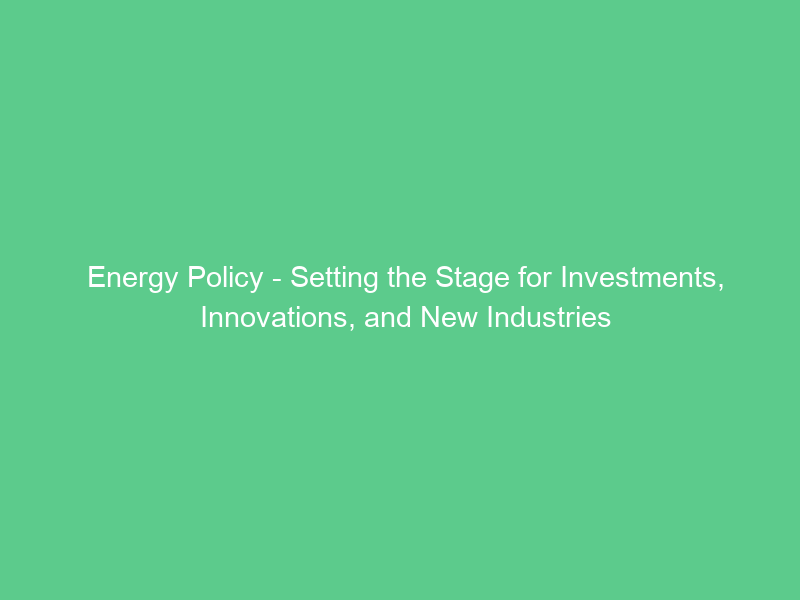Energy policy provides the foundation for investments, innovations and new industries that bring jobs and prosperity to a livable planet. Promoting renewables, efficiency measures and expanding electricity transmission infrastructure as well as updating storage options is essential.
Numerous energy policies utilize financial incentives, such as tax breaks, rebates, or loans as financial inducements to support various forms of energy production. Other policies use carbon pollution pricing policies as incentives for various kinds of renewable energies.
Fossil Fuels
Fossil fuels, such as coal, oil and natural gas, are nonrenewable energy sources formed from ancient plant and animal matter buried deep underground by heat and pressure from deep burial, where organic molecules were broken apart by heat and pressure to release their stored energy. Today fossil fuel companies drill or mine these materials before burning or transporting them as needed.
Fossil fuel subsidies that reduce gasoline and electricity prices erode affordability and encourage overuse, increasing vulnerability to energy price volatility and disruption, particularly for lower-income households.
Production subsidies boost profits for fossil fuel companies selling into international markets and increase dependence, leaving countries vulnerable to market fluctuations and geopolitical shocks. Furthermore, production subsidies discourage investments in domestic renewables or technologies which could help improve energy self-sufficiency while energy efficiency measures are far more cost-effective at improving affordability and security.
Renewable Energy
Renewable energy technologies operate on virtually inexhaustible supplies of natural fuels that can help lower carbon emissions and boost economic development. They could therefore become key elements in driving down greenhouse emissions while supporting economic development.
Implementing renewable energy policies is one way that governments can support the transition towards a low-carbon economy. They may offer tax credits, set production targets or introduce a mandate to source renewables.
Many countries have implemented policies to increase renewables’ share in electricity generation and thereby significantly reduce CO2 emissions from power production. Furthermore, renewables may help diversify supply sources to mitigate against market shocks or geopolitics-based disruptions of their supply.
This study utilizes cross-country panel regressions to identify policies that influence renewable energy production in developing countries. It finds that developing nations whose policies appear more aligned with those adopted by major donors–namely approaches to market structures and policy instruments–are more likely to adopt such types of policies.
Energy Efficiency
Energy efficiency refers to the ability to produce more goods or services with equal energy inputs, whether through regulation, information dissemination or incentives. At NRDC we work to develop and implement programs designed to promote energy efficiency across buildings, transportation modes, appliances and consumer behaviors.
Energy efficiency is a cornerstone strategy of global climate goals, and one effective approach to doing this is by speeding up electrification and improving technical efficiencies, while simultaneously encouraging behavioral changes.
Regulatory policies such as appliance standards and labels play an integral role in improving energy efficiency, while subsidies targeting low-income neighborhoods or individuals can further increase it. Such subsidies can encourage use of solar technology at homes and businesses alike, help consumers manage electricity usage more efficiently, promote electric vehicles, as well as assist consumers to control it all better. Further research will need to be completed in order to identify those in greatest need – this may involve “tagging” systems which identify such households.
Energy Security
Countries pursue energy policies tailored to their national interests, considering issues like decarbonization, system reliability, resource diversification, technology export potential and economic costs when making their decisions. They also align themselves with international goals such as those set out by Paris Agreement and Sustainable Development Goals on various fronts.
Economics such as rising energy costs can become an enormous financial strain for lower-income households. Physical factors, such as inadequate heating or cooling in homes or offices or an inability to transport or store energy sources can create energy insecurity as well.
Political and geopolitical considerations play an enormous role in energy policymaking. Russia’s invasion of Ukraine spurred European nations to assess their natural gas security once more and reignited energy-security worries; international conflicts may disrupt energy flows altogether and drive nations towards alternative sources for their needs. Energy security will remain an enduring consideration that will shape global energy policy far into the future; governments worldwide face an ongoing trilemma as they attempt to balance it.

